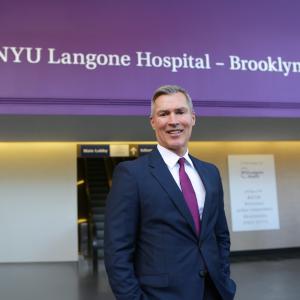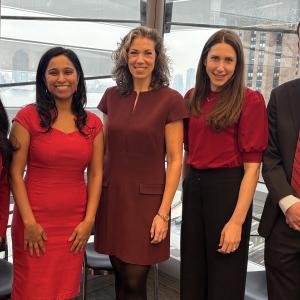Bret J. Rudy, MD, Executive Hospital Director and Senior Vice President at NYU Langone Hospital—Brooklyn, Discusses the Hospital’s Role in Shaping Healthcare in New York City’s Most Populous Borough

Dr. Bret J. Rudy took the helm at NYU Langone Hospital–Brooklyn in July 2016, when he was appointed executive hospital director and senior vice president.
PHOTO: NYU Langone Staff
Over the next 5 years, NYU Langone plans to invest more than $500 million in NYU Langone Hospital—Brooklyn. We sat down with Bret J. Rudy, MD, executive hospital director and senior vice president of NYU Langone Hospital—Brooklyn, to talk about this historic investment and how it will shape healthcare in New York City’s most populous borough.
Why invest in Brooklyn?
About 30 percent of NYU Langone’s patients live in Brooklyn, and about 50 percent of the babies born at Tisch Hospital go home to Brooklyn. Why should patients have to travel all the way into Manhattan? No one wants to get on a subway or drive an hour for a doctor’s appointment. So our goal is to bring to Brooklyn the same high standard of care that attracts people to NYU Langone’s main campus, and to be successful, we can’t just fix a little bit and walk away. We need to fix everything. We need to invest in better programs, better facilities, the latest technology, and greater breadth in clinical expertise. What we’re doing at NYU Langone Hospital—Brooklyn is very different from anything else that is happening in Brooklyn right now.
You’ve said that NYU Langone Hospital—Brooklyn wants to be the hospital of choice in Brooklyn. How so?
Dean Grossman has been very clear in his vision for NYU Langone Hospital—Brooklyn. He wants one high standard of care for all NYU Langone patients. So while we want to be the best hospital in Brooklyn, we also have to be one of the best hospitals in the country.
What are your top priorities?
First, we must continue to recruit high-quality physicians and further elevate our standard of care. We must also align ourselves with physicians in the community so that they feel good about sending their patients to us. We’re a big academic medical center, but we must remember that patients are connected to their doctors, so we want to make sure that we collaborate and communicate with those physicians. Another big focus is modernizing our facilities so that they enhance the patient experience. Setting the highest standards for quality, safety, and effciency is critical to our success. We’re always looking for opportunities to say: “What can we do better?”
How does NYU Langone Hospital—Brooklyn’s diverse patient population shape the programs you develop?
If you look at the major languages spoken in the community—Spanish, Chinese, Arabic, Russian—English is pretty far down on the list. But providing culturally competent care is more than just having employees who speak the same language as our patients. It’s really about training staff to understand the unique medical needs of the populations we serve.
Do segments of NYU Langone Hospital—Brooklyn’s patient population face particularly daunting medical challenges?
Many of our patients do not get adequate care, so they come in with advanced disease. For example, we see higher rates of obesity, with all the complications that entails: type 2 diabetes, hypertension, and other serious conditions. So as a leading academic medical center, we can offer the very best clinical care, but we can also help address problems at the community level. For instance, NYU Langone’s Department of Population Health has expertise in studying underserved populations and implementing innovative care models to improve the health of those communities.
Why is it so important to operate as a single, unified medical center?
When we’re all one faculty and one health system, we can centralize and integrate our resources and expertise. That translates into better, more convenient care. For example, our plan is to have specialists from our Transplant Institute see patients in Brooklyn, perform surgery with their dedicated teams at NYU Langone’s Tisch Hospital, and follow up with those patients back home in Brooklyn.
As an adolescent medicine specialist, how did your training prepare you for this role?
I was an adolescent HIV specialist at the Children’s Hospital of Philadelphia, where we had a big program. The abject poverty was unlike anything I had ever seen. Even though I was working at a big academic center, I had to stay very connected to the community. The mission of every academic medical center is to be on the cutting edge, but the greatest ones treat all of their patients equally.
Where do you expect NYU Langone Hospital—Brooklyn to be in five years?
The caliber of our programs and services will be better than ever, particularly in surgical specialties. Our physicians and nursing teams will be better than ever. Overall, we’ll be a much more efficient hospital, and that will translate into higher confidence and a far better experience for patients. With all this, the community will benefit—NYU Langone Hospital—Brooklyn is the single largest employer in Sunset Park—and Brooklyn will benefit. I think we’ll serve as a model for how hospitals can merge successfully, and a touchstone for high-quality, patient-centered healthcare in Brooklyn.

